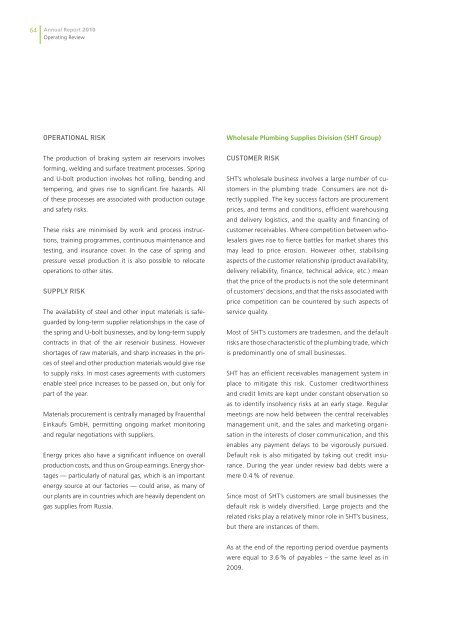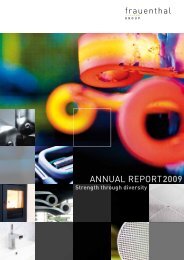Annual Report 2010 - Frauenthal Holding AG
Annual Report 2010 - Frauenthal Holding AG
Annual Report 2010 - Frauenthal Holding AG
You also want an ePaper? Increase the reach of your titles
YUMPU automatically turns print PDFs into web optimized ePapers that Google loves.
64 <strong>Annual</strong> <strong>Report</strong> <strong>2010</strong><br />
Operating Review<br />
oPerational riSk<br />
The production of braking system air reservoirs involves<br />
forming, welding and surface treatment processes. Spring<br />
and U-bolt production involves hot rolling, bending and<br />
tempering, and gives rise to significant fire hazards. All<br />
of these processes are associated with production outage<br />
and safety risks.<br />
These risks are minimised by work and process instructions,<br />
training programmes, continuous maintenance and<br />
testing, and insurance cover. In the case of spring and<br />
pressure vessel production it is also possible to relocate<br />
operations to other sites.<br />
SuPPly riSk<br />
The availability of steel and other input materials is safeguarded<br />
by long-term supplier relationships in the case of<br />
the spring and U-bolt businesses, and by long-term supply<br />
contracts in that of the air reservoir business. However<br />
shortages of raw materials, and sharp increases in the prices<br />
of steel and other production materials would give rise<br />
to supply risks. In most cases agreements with customers<br />
enable steel price increases to be passed on, but only for<br />
part of the year.<br />
Materials procurement is centrally managed by <strong>Frauenthal</strong><br />
Einkaufs GmbH, permitting ongoing market monitoring<br />
and regular negotiations with suppliers.<br />
Energy prices also have a significant influence on overall<br />
production costs, and thus on Group earnings. Energy shortages<br />
— particularly of natural gas, which is an important<br />
energy source at our factories — could arise, as many of<br />
our plants are in countries which are heavily dependent on<br />
gas supplies from Russia.<br />
Wholesale Plumbing Supplies Division (SHT Group)<br />
CuStoMer riSk<br />
SHT’s wholesale business involves a large number of customers<br />
in the plumbing trade. Consumers are not directly<br />
supplied. The key success factors are procurement<br />
prices, and terms and conditions, efficient warehousing<br />
and delivery logistics, and the quality and financing of<br />
customer receivables. Where competition between wholesalers<br />
gives rise to fierce battles for market shares this<br />
may lead to price erosion. However other, stabilising<br />
aspects of the customer relationship (product availability,<br />
delivery reliability, finance, technical advice, etc.) mean<br />
that the price of the products is not the sole determinant<br />
of customers’ decisions, and that the risks associated with<br />
price competition can be countered by such aspects of<br />
service quality.<br />
Most of SHT’s customers are tradesmen, and the default<br />
risks are those characteristic of the plumbing trade, which<br />
is predominantly one of small businesses.<br />
SHT has an efficient receivables management system in<br />
place to mitigate this risk. Customer creditworthiness<br />
and credit limits are kept under constant observation so<br />
as to identify insolvency risks at an early stage. Regular<br />
meetings are now held between the central receivables<br />
management unit, and the sales and marketing organisation<br />
in the interests of closer communication, and this<br />
enables any payment delays to be vigorously pursued.<br />
Default risk is also mitigated by taking out credit insurance.<br />
During the year under review bad debts were a<br />
mere 0.4 % of revenue.<br />
Since most of SHT’s customers are small businesses the<br />
default risk is widely diversified. Large projects and the<br />
related risks play a relatively minor role in SHT’s business,<br />
but there are instances of them.<br />
As at the end of the reporting period overdue payments<br />
were equal to 3.6 % of payables – the same level as in<br />
2009.




